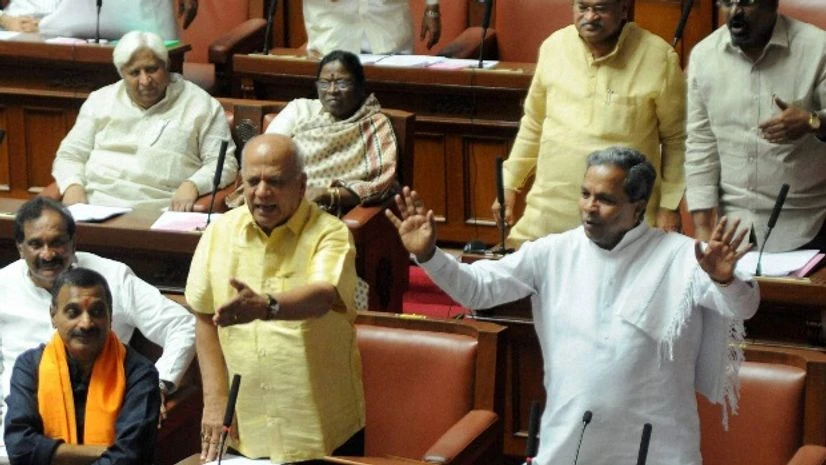Chief Minister Siddaramaiah, who also has the finance portfolio, on Friday raised fuel prices and taxes on commercial vehicles in his Budget for the state government's coming year, with a focus on decongesting this city.
He committed Rs 5,000 crore to improve the city's infrastructure. And, eliminated all levies on electric vehicles and LED-bulbs, to encourage adoption of ecologically-friendly solutions.
Presenting his fourth Budget of the current Congress government (in all, as state finance minister, this was his 11th Budget) on Friday, the CM emphasised on improving the infrastructure in the central business district here, as well as the information technology and industrial clusters at Whitefield and Peenya.
The Rs 5,000-crore grant for this is in addition to a Rs 4,223-crore provision for the Bruhat Bengaluru Mahanagara Palike, the city's civic body. The state will also set up an elevated road network of over 100 km with an investment of Rs 18,000 crore through a public-private partnership model.
He said the aim was to add sheen to 'Brand Bengaluru', by achieving "effective convergence of the grants given to the city through different institutions". Bengaluru, India's technology capital has more vehicles per sq km than any other city in the country. The city with a population of 11 million has six million vehicles.
"The special grant will hopefully work in decongesting these bottlenecks and evolve a comprehensive road network and an efficient transportation system. Besides, the improvement of civic environment through allocating funds for Solid Waste Management and Storm Water Drain are welcome initiatives as they have pertinent bearings on the city's well-being," Satish B. N., Executive Director - South, Knight Frank (India) Pvt. Ltd.
Siddaramaiah increased taxes on taxis and commercial vehicles, fuel prices, carbonated drinks such as Pepsi and Coca Cola, entertainment tax on cable and DTH providers, liquor and beer and stamp duty on properties.
While there was an impetus on Bengaluru, Siddaramaiah, who has presented in all 11 budgets for the state as a finance minister gave a huge impetus to agriculture in the budget with support of Rs 4344 crore. He announced setting up of special agricultural zones that would adopt modern technology to improve productivity on the lines of special economic zones.
Agriculture's contribution to the state's economy has reduced to 8% from 14%, while manufacturing increased to 15% from 12%. Services contribute 64% to the state's economy as against 59% earlier. The contribution of the technology sector has doubled to 18% from 9%, driven largely by the focus of tech intensive startups in its capital Bengaluru.
agrThe gross state domestic product (GSDP) in the year 2015-16 grew at 6.2% as against 7.8% in the previous year, due to the decline in the growth rate of agriculture sector. The agriculture sector is estimated to decline by 4.7% during this year, mainly due to drought in 137 taluks during kharif and 62 taluks during the rabi crop seasons, he said.
Siddaramaiah said the decline in farm growth mainly attributable to fall in foodgrains production from 126 lakh tones during 2014-15 to 110 lakh tones in 2015-16 due to drought.
The industry lauded the budget. "The budget lays emphasis on the agriculture sector, but it also provids support for Industry. Infrastructure has been a focus area of the budget. Overall a very good and progressive budget," said CII Karnataka Chairman Ravi Raghavan, Managing Director Bharat Fritz Werner Ltd in a statement.

)
